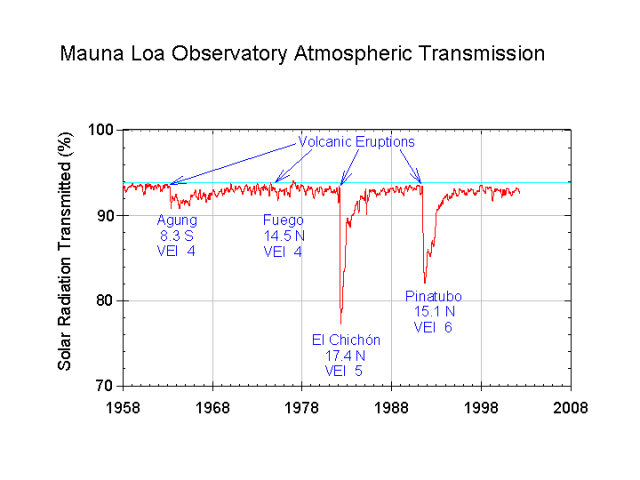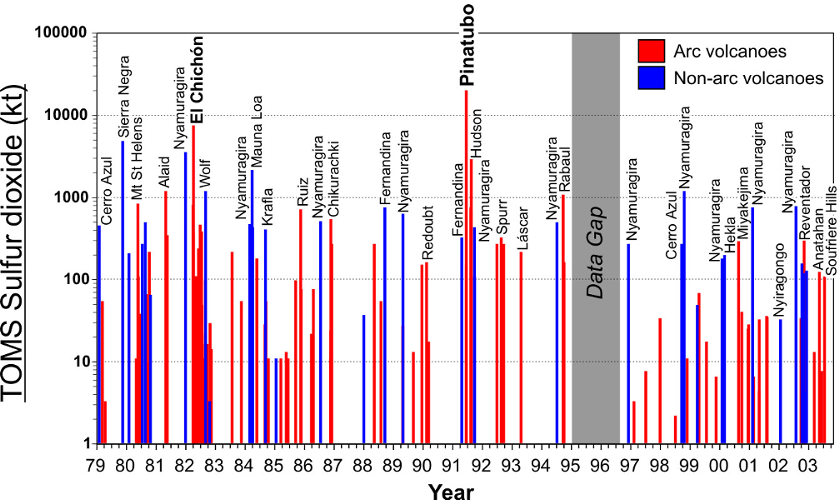Makes sense to me . . . that's true of most soluble gas-water systems . . . . thanks!
Is THAT the entire list? . . . I was hoping for more . . . . Merry Christmas!
wlminex
Google Carbonate Compensation Depth if you want to learn more.
Makes sense to me . . . that's true of most soluble gas-water systems . . . . thanks!
Is THAT the entire list? . . . I was hoping for more . . . . Merry Christmas!
wlminex
Moderator Note:
First and only warning. This is the Earth Science subforum, not the politics subforum.
Please try and keep that in mind.
Google Carbonate Compensation Depth if you want to learn more.
Moderator Note:
First and only warning. This is the Earth Science subforum, not the politics subforum.
Please try and keep that in mind.
Trippy: Sorry for this enquiry . . . if it infringes on your posted warning . . . I'm unsure whether this warning was directed solely to me . . . or also for, Kwilborn (post #4), . . . or Billvon (post #6) . . . or Origin (post #2). . . . or The Esoterest (post #15) . . . or the original post Jhon Cooper Matrin (Post #1).
Thanks for your clarification . . . . I await your response . . . First-and-only warnings are serious!!
The effects of volcanic eruptions on climate are extremely important and have not been properly evaluated at this time,


. . . .note: >> volcanic SO2 emissions may also contribute to 'acid rain'.
Proposed causal mechanisms involve harmonics of Milankovitch (orbital) forcing, thermohaline circulation, internal ocean–atmosphere oscillations, solar forcing, and even long-period tidal resonances in the motions of the Earth and Moon.
adoucette said:Aqueous Id said:Other than the time correlation, it does not seem to stand out from the almost periodic ripples in the data. If Pinatubo were not annotated on the graph, I would not have assumed that it was the cause of the 1991 fluctuation.
Nah, go back and read the reports written at the time, the drop (notice how steep the drop is) is quite clear and it is very hemispheric (Volcanoes tend to have a much more pronounced effect in their own hemisphere).
That chart of course is the entire globe so it smooths it out a bit.
Indeed, SOx emission seems to have been ignored in the OP, where he attributes impact to the number of square miles of ejecta. The amplitude I was referring to is the amplitude of temperature change. I don't disagree with your point, just that his remarks about amplitude are not correct. Where I disagree with you is on correlation between the timing of Chichon's eruption and the timing of the swing on the graph, and the significant difference in comparison to the apparent time correlation with Pinatubo.adoucette said:Amplitude isn't the factor, it is the height of the injection of material and the type of material injected. Chichon was noted for its large quantity of SOx which has a strong cooling effect.Aqueous id said:The data doesn't seem to correlate with a 1982 eruption. Whatever happened in 1983 appears to have had an equivalent shape as 1991. And apparently Chichon was 10 to 100 times smaller than Pinatubo, yet the trends (at 1983) look similar in amplitude to Pinatubo.
The only linearity of interest is that of the correlation coefficient. I was referring to the elephant in the room, CO2 escalation, and noting that volcanism is not the leading cause.adoucette said:???Aqueous id said:And of course, none of this seems to correlate with rising CO2, which the OP skirted anyway.
Temp is going up and CO2 is going up.
Do you expect there to be a linear relationship?
This seems like a huge amount of CO2, but a visit to the U.S. Department of Energy's Carbon Dioxide Information Analysis Center (CDIAC) website (http://cdiac.ornl.gov/) helps anyone armed with a handheld calculator and a high school chemistry text put the volcanic CO2 tally into perspective. Because while 200 million tonnes of CO2 is large, the global fossil fuel CO2 emissions for 2003 tipped the scales at 26.8 billion tonnes. Thus, not only does volcanic CO2 not dwarf that of human activity, it actually comprises less than 1 percent of that value.
You missed my point. I was only speaking to this particular data set, strictly from a data analysis point of view. The swings in temperature during the volcanoes noted are not significantly different in amplitude or curvature than every other fluctuation over the time span shown. Therefore, I would not have been able to conclude from this graph alone that volcanoes influenced temperature. In other words, I can not impute a correlation coefficient from this graph that affirms the conclusion. (Note, I am not denying that volcanism affects temperature.)

Indeed, SOx emission seems to have been ignored in the OP, where he attributes impact to the number of square miles of ejecta. The amplitude I was referring to is the amplitude of temperature change. I don't disagree with your point, just that his remarks about amplitude are not correct. Where I disagree with you is on correlation between the timing of Chichon's eruption and the timing of the swing on the graph, and the significant difference in comparison to the apparent time correlation with Pinatubo.
By "correlation" I was only referring to the calculated correlation coefficient.
The only linearity of interest is that of the correlation coefficient. I was referring to the elephant in the room, CO2 escalation, and noting that volcanism is not the leading cause.
It will? Sounds great on paper, especially if you leave the health of the global economy out of your "equation for what is better".Trying to change the way humans pollute today will only be helping tomorrow be better.
...climate change is primarily a political issue; threatening others when they expose the true agenda behind its proponents does not change this fact.Trippy said:Moderator Note:
First and only warning. This is the Earth Science subforum, not the politics subforum.
Please try and keep that in mind.
...climate change is primarily a political issue; threatening others when they expose the true agenda behind its proponents does not change this fact.
Fair point, agreed. What bothers me is when people condescendingly frame the issue as Science vs Anti-Science but then, perhaps inadvertently, interject their own subjective, emotional and often self-serving conclusions into the discussion.No. Climate change is science. Alarmism and denialism are political issues.
climate change is primarily a political issue; threatening others when they expose the true agenda behind its proponents does not change this fact.
The science behind prediction of climate change is as well established as clocks governed by pendulums, it boils down to the same physics, simple harmonic motion.No. Climate change is science. Alarmism and denialism are political issues.
That wasn't what I was doing though, was it.Fair point, agreed. What bothers me is when people condescendingly frame the issue as Science vs Anti-Science but then, perhaps inadvertently, interject their own subjective, emotional and often self-serving conclusions into the discussion.
Is it? Or at some point does it become a matter of self preservation (self preservation being used here in a broader sense to include life styles, rather than neccessarily just the survival of the species).I mean, even if we were to all magically concur that the worst-case scenarios of AGW were true, the very conclusion that "something must be done" is not itself a scientific conclusion but rather simply an opinion.
Are you saying predicting climate change is a function of simple harmonic motion, or are you saying that the science behind that prediction is as well established and reliable as the physics behind clocks governed by pendulums? I would be surprised if you meant the former because that seems to be a stance against AGW, but I would also be surprised if you meant the latter because that is plainly ridiculous.The science behind prediction of climate change is as well established as clocks governed by pendulums, it boils down to the same physics, simple harmonic motion.
It may have been politicized, but it is a scientific issue before it is a political one.
Ah! But the AGW alarmists are pursuing others to change their life styles today, which would have highly questionable effectiveness, based upon inconclusive data. IF it ever becomes clear that it's an issue of survival I assure you there won't be any resistance to changing our lifestyles.Trippy said:Is it? Or at some point does it become a matter of self preservation (self preservation being used here in a broader sense to include life styles, rather than neccessarily just the survival of the species).
I am stating that the prediction that increasing ppCO[sub]2[/sub] will increase the amount of long wave thermal radiation re-radiated by the earth, being absorbed by the atmosphere is a prediction that comes out of simple harmonic motion (with the earth's thermal emission spectrum being goverend by gray body radiation). The prediction of greenhouse gasses predates the prediction that changing their levels could influence climate.Are you saying predicting climate change is a function of simple harmonic motion, or are you saying that the science behind that prediction is as well established and reliable as the physics behind clocks governed by pendulums? I would be surprised if you meant the former because that seems to be a stance against AGW, but I would also be surprised if you meant the latter because that is plainly ridiculous.
Is it really alarmisim to encourage people to lead lifestyles that have less of an impact on the environment? After all, we all want clean air to breathe, clean water to drink, lakes and rivers to swim in during the summer, good food to eat, and so on.Ah! But the AGW alarmists are pursuing others to change their life styles today, which would have highly questionable effectiveness, based upon inconclusive data.
Standards of proof is a different issue.IF it ever becomes clear that it's an issue of survival I assure you there won't be any resistance to changing our lifestyles.
It's not. Whether its long term effects are deleterious or advantageous depends very much upon where you live. Many of the predicted effects come about as a result of the rapidity of the change, or as secondary effects, rather than neccessarily the magnitude of the change, and in terms of human cost, it's generally expected (I believe anyway) that the cost of doing nothing will probably outweigh the costs of taking action, but to some extent it's like trying to convince a city council to invest in infratructure that doesn't need to be replaced yet.(Also, this opens up a topic that I rarely see addressed but I do find it impossible to believe that the ONLY side effects of a warmer planet would be devastation. If anything, erratic swings in temperature are more stressful upon life in general, and green house gases basically act as a thermal insulator. I mean, despite evidence of large historical temperature swings, it's the very narrow global temperature band of today in which life must precariously reside??)
